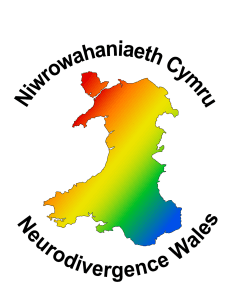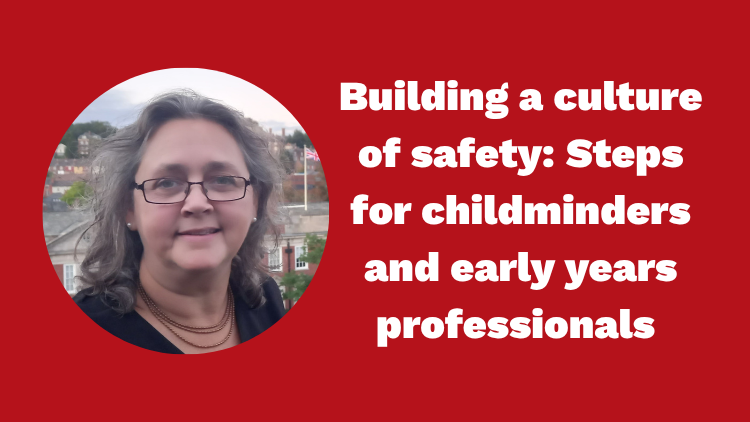
PACEY Cymru has spoken to Frances Rees, National Neurodivergence Development Officer, for Neurodivergence Cymru.
Neurodivergence Cymru presented a series of webinars for PACEY members in Wales on Understanding Neurodivergence which align with Curriculum for Wales, particularly the child-centred approach. The sessions were tailored to help practitioners further understand neurodivergent conditions and how to create a neurodivergent friendly environment in settings for children and their families. Frances explained the importance of being compassionate and understanding, and role of the enabling adult in enhancing experiences to help neurodivergent children understand the world around them.
Following the webinars, PACEY Cymru spoke to Frances about neurodivergence and her experiences:
Tell us about yourself and how you came to work in your role?
I have worked with children and young people for most of my career. After returning from a two-year English as Second Language (ESL) teaching contract in South Korea, I started working as a Childcare Officer in one of Carmarthenshire’s short break centres. After five years I moved on to work in and later manage a brand new residential special school for autistic children and young people with co-occurring conditions.
I joined the National Autism Team (now the National Neurodivergence Team) nearly eight years ago to assist with establishing the Integrated Autism Services in West Wales. My current role focuses on delivering and commissioning training. I am the mother of two neurodivergent boys and self-identify as neurodivergent.
What is neurodivergence?
Neurodivergence can best be explained through the neurodiversity paradigm. It a specific perspective on neurodiversity, reflecting that neurodiversity is a natural and valuable form of human diversity. The idea that there is one ‘normal’ or ‘healthy’ type of brain or mind, or one ‘right’ style of neurocognitive functioning, is culturally constructed and no more valid than the idea that there is one ‘normal’ or ‘right’ ethnicity, gender, or culture. There is no one better or correct way to be all neurotypes are equally valued.
What can settings do to support neurodivergent children?
Ultimately every child is unique, understanding the world from their perspective is key. They may play, explore, socialise, create, and communicate in a different way, outside of our usual expectations of their peers.
Start with what would a good day look like for that child. This may include adaptations to the environment to include sensory considerations. Understanding that a child’s communications needs may need additional support.
The need for structure and a consistent routine will help to reduce anxiety.
In what ways do you think government policy and the wider sector could improve in terms of support for neurodivergent children?
By having increased knowledge and understanding of current approaches and opportunities. We have a range of free bilingual resources that any sector can access. We also have bespoke resources for education including our early years sector resources.
What are some of the challenges for families with neurodivergent children in accessing childcare?
Finding a suitable provision with enabling adults that will provide a neuroinclusive childcare setting can be difficult. Some larger settings may be more difficult to adapt to. For example, a larger, commercial childcare setting was not ideal for my son. A childminder may have been better suited for him.
Why is it important to create partnerships with parents and other professionals to support neurodivergent children?
Partnerships between parents and professionals are crucial in ensuring that there is a really clear picture of the individual child, their strengths, challenges, any passions. The aim should be to work together to build up a really comprehensive picture of the child to ensure that they are understood and cared for in a neuro-affirming way. Collaboration is key. Learning from one another, strategies, top tips that can positively support a child across different settings.
If you could pass on any words of advice or encouragement to childcare professionals reading this, what would they be?
Respect the child. Their uniqueness. Look to their strengths and potential to encourage them. The goal should be to help them thrive and that only starts to happen when we, as enabling adults, create the space and time to consider the needs of the child first.
You have delivered training for PACEY members in Wales, which was well received, what other support and training is available from Neurodivergence Wales?
The resources I mention above and also our Community of Practice sessions for professionals. We also have Parents and Carers Virtual Advice Sessions run monthly, parents and carers can join live or watch the replay.
Signpost

Mae PACEY Cymru wedi siarad â Frances Rees, Swyddog Datblygu Niwroymgyfeirio Cenedlaethol, ar gyfer Niwrowahaniaeth Cymru.
Cyflwynodd Niwrowahaniaeth Cymru gyfres o weminarau ar gyfer aelodau PACEY yng Nghymru ar Deall Niwroamrywiaeth sy'n cyd-fynd â Cwricwlwm i Gymru, yn enwedig y dull sy'n canolbwyntio ar y plentyn. Cafodd y sesiynau eu teilwra i helpu ymarferwyr i ddeall cyflyrau niwrowahaniaeth ymhellach a sut i greu amgylchedd cyfeillgar niwrowahaniaeth mewn lleoliadau ar gyfer plant a'u teuluoedd. Esboniodd Frances bwysigrwydd bod yn dosturiol a dealltwriaeth, a rôl yr oedolyn sy'n galluogi i wella profiadau i helpu plant niwrowahaniaeth i ddeall y byd o'u cwmpas.
Yn dilyn y gweminarau, siaradodd PACEY Cymru â Frances Rees, am niwrowahaniaeth a'i phrofiadau.
Dywedwch wrthym amdanoch chi'ch hun a sut y daethoch chi i weithio yn eich rôl?
Rwyf wedi gweithio gyda phlant a phobl ifanc am y rhan fwyaf o'm gyrfa. Ar ôl dychwelyd o gontract addysgu Saesneg fel Ail Iaith (ESL) dwy flynedd yn Ne Korea, dechreuais weithio fel Swyddog Gofal Plant yn un o ganolfannau gwyliau byr Sir Gaerfyrddin. Ar ôl pum mlynedd, symudais ymlaen i weithio mewn ysgol arbennig breswyl newydd sbon ar gyfer plant a phobl ifanc awtistig sydd â chyflyrau cyd-ddigwydd.
Ymunais â'r Tîm Awtistiaeth Cenedlaethol (y Tîm Niwrowahaniaeth Cenedlaethol erbyn hyn) bron i wyth mlynedd yn ôl i gynorthwyo i sefydlu'r Gwasanaethau Awtistiaeth Integredig yng Ngorllewin Cymru. Mae fy rôl bresennol yn canolbwyntio ar ddarparu a chomisiynu hyfforddiant. Rwy'n fam i ddau o fechgyn niwrowahaniaeth ac yn hunan-adnabod fel niwrowahaniaeth.
Beth yw niwrowahaniaeth?
Y ffordd orau o esbonio niwrowahaniaethu yw trwy'r patrwm niwroamrywiaeth. Mae'n bersbectif penodol ar niwroamrywiaeth, gan adlewyrchu bod niwroamrywiaeth yn ffurf naturiol a gwerthfawr o amrywiaeth ddynol. Mae’r syniad bod un math ‘normal’ neu ‘iach’ o ymennydd neu feddwl, neu un arddull ‘gywir’ o weithrediad niwrowybyddol, wedi’i lunio’n ddiwylliannol ac nid yw’n fwy dilys na’r syniad bod un ethnigrwydd, rhyw neu ddiwylliant ‘normal’ neu ‘gywir’. Nid oes un ffordd well na chywir o fod pob niwrodeip yn cael ei werthfawrogi'n gyfartal.
Beth all lleoliadau ei wneud i gefnogi plant niwrowahaniaeth?
Yn y pen draw, mae pob plentyn yn unigryw, mae deall y byd o'i safbwynt yn allweddol. Gallant chwarae, archwilio, cymdeithasu, creu, a chyfathrebu mewn ffordd wahanol, y tu allan i'n disgwyliadau arferol o'u cyfoedion.
Dechreuwch gyda sut olwg fyddai ar ddiwrnod da i'r plentyn hwnnw. Gall hyn gynnwys addasiadau i'r amgylchedd i gynnwys ystyriaethau synhwyraidd. Deall y gallai fod angen cymorth ychwanegol ar anghenion cyfathrebu plentyn.
Bydd angen strwythur a threfn gyson yn helpu i leihau pryder.
Ym mha ffyrdd ydych chi'n meddwl y gallai polisi'r llywodraeth a'r sector ehangach wella o ran cefnogaeth i blant niwrowahaniaeth?
Trwy gynyddu gwybodaeth a dealltwriaeth o ddulliau a chyfleoedd cyfredol. Mae gennym amrywiaeth o adnoddau dwyieithog am ddim y gall unrhyw sector eu cyrchu. Mae gennym hefyd adnoddau pwrpasol ar gyfer addysg, gan gynnwys ein sector blynyddoedd cynnar.
Beth yw rhai o'r heriau i deuluoedd sydd â phlant niwrowahaniaeth wrth gael mynediad at ofal plant?
Gall fod yn anodd dod o hyd i ddarpariaeth addas gydag oedolion sy’n galluogi a fydd yn darparu lleoliad gofal plant niwro-gynhwysol. Gall dod o hyd i'r lleoliad cywir ar gyfer eu plentyn fod yn anodd. Efallai y bydd rhai gosodiadau mwy yn fwy anodd addasu iddynt. Er enghraifft, nid oedd lleoliad gofal plant mwy masnachol yn ddelfrydol ar gyfer fy mab. Efallai y byddai gwarchodwr plant wedi bod yn fwy addas iddo.
Pam mae'n bwysig creu partneriaethau gyda rhieni a gweithwyr proffesiynol eraill i gefnogi plant niwrowahaniaeth?
Mae partneriaethau rhwng rhieni a gweithwyr proffesiynol yn hanfodol i sicrhau bod yna darlun clir iawn o'r plentyn unigol, ei gryfderau, ei heriau, unrhyw angerdd. Y nod ddylai fod gweithio gyda'n gilydd i greu darlun cynhwysfawr iawn o'r plentyn i sicrhau ei fod yn cael ei ddeall a'i ofalu amdano mewn ffordd niwrogadarnhaol. Mae cydweithio'n allweddol. Dysgu oddi wrth ei gilydd, unrhyw strategaethau, awgrymiadau gorau a all gefnogi plentyn yn gadarnhaol ar draws gwahanol leoliadau.
Pe gallech chi drosglwyddo unrhyw eiriau o gyngor neu anogaeth i weithwyr gofal plant proffesiynol sy'n darllen hwn, beth fydden nhw?
Parchwch y plenty. Eu hunigrywiaeth. Edrychwch ar eu cryfderau a'u potensial i'w hannog nhw. Y nod ddylai fod i'w helpu i ffynnu, bydd hyn ond yn digwydd pan fyddwn ni, fel oedolion sy’n galluogi dysgu, yn creu'r lle a'r amser i ystyried anghenion y plentyn yn gyntaf.
Rydych chi wedi darparu hyfforddiant i aelodau PACEY yng Nghymru a gafodd dderbyniad da iawn, pa gymorth a hyfforddiant arall sydd ar gael gan niwrowahaniaeth Cymru?
Yr adnoddau yr wyf yn sôn amdanynt uchod a hefyd ein Sesiynau Cymuned Ymarfer ar gyfer gweithwyr proffesiynol. Mae gennym hefyd Sesiynau Cyngor Rhithiol Rhieni a Gofalwyr yn cael ei redeg bob mis, gall rhieni a gofalwyr ymuno yn fyw neu wylio'r ailchwarae.
Signpost




